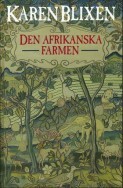Take a photo of a barcode or cover
Super anstrengend zu lesen, einige Formulierungen äußerst fragwürdig und es zieht sich total. Grundsätzlich fand ich die Idee super spannend, eine Frau zu Beginn des 20. Jahrhunderts allein auf einer Farm in Nairobi. Und dann noch auf meiner Reise in Tansania in einem Hotelbücherregal gefunden. Die Beschreibungen ihrer Naturerlebnisse waren super detailreich und anschaulich, besonders weil ich in dem Moment ja selbst vor Ort war. Das war dann aber auch das einzige was mehr oder weniger an dem Buch Spass gemacht hat.
Das ständige selbstverherrlichende von oben herab und white saviourism ging mir mächtig auf die Nerven. Und ich dachte mir nur noch wie hohl und doof dieses Buch ist, vor allem aus der Position eines deutschen Touristen im 21. Jahrhundert in Tansania.
Das ständige selbstverherrlichende von oben herab und white saviourism ging mir mächtig auf die Nerven. Und ich dachte mir nur noch wie hohl und doof dieses Buch ist, vor allem aus der Position eines deutschen Touristen im 21. Jahrhundert in Tansania.
Yikes. Between the author’s nonchalant attitude for blatantly assisting in colonizing Kenya, her pride in brainwashing uneducated children with Christianity, and getting an adrenaline rush by shooting many lions, this book made me kinda sick. I know it was a different time, but I don’t think there is much of an excuse for the author’s blatant feelings of supremacy. She treated her squatters like slaves and hardly had any respect for them. She loved be fully in charge and got off on controlling the surrounding area due to her European experience and education. I also didn’t like how the sections don't have much to do with each other and don't really connect.
I enjoyed the reading her old fashioned writing style and learning more about Africa, but that was overpowered by the author’s sickening immoral compass.
I enjoyed the reading her old fashioned writing style and learning more about Africa, but that was overpowered by the author’s sickening immoral compass.
adventurous
emotional
hopeful
medium-paced
DNF: This memoir of a well-to-do white British lady's years spent operating a coffee farm in Kenya landed on my TBR list after reading Beatriz Williams' Her Last Flight. I made it only halfway through the second chapter before recognizing that it was just not that interesting and so slow that it was putting me to sleep. But more significantly, it is pretty cringey in its colonialist perspective, particularly with respect to the "natives," whom the author mentions frequently in a condescending and dehumanizing manner. While it may still have merit from a scholarly angle, it certainly hasn't aged well otherwise.
Out of Africa is a memoir and collection of stories about Isak Dineson's time running a farm in Kenya in the early 20th century. Dineson was the pen name for Danish Baroness Karen Blixen who wrote other novels and story collections including Seven Gothic Tales and Babette's Feast.
The book was published in 1937 and details her time on the farm from 1914-1931 and portrays her life and that of her African workers, local tribes, the local animals, and a few visiting Europeans.
"I had a farm in Africa, at the foot of the Ngong Hills. The equator runs across these highlands, a hundred miles to the North, and the farm lay at an altitude of over six thousand feet. In the day-time you felt that you had got high up, near to the sun, but the early mornings and evenings were limpid and restful, and the nights were cold."
So begins the book, and those words, "I had a farm in Africa..." could as well be "Once upon a time..."
You may know the story from the Meryl Streep film of the same name (with Robert Redford as Blixen's lover Denys). There is that story--but combine that with the other stories, vignettes, and the philosophies of the Natives. I would say characters in the book are treated with more empathy. Dinesen has an anthropological eye with the heart of Schezerade. Her stories will draw you in and keep you on her pages. Like Denys, you will want to sit by her fire and hear her tales.
This was my third time around with the book and I will read it again and again. If you like books about ex-pats living and discovering other countries, this is one of the best. For a twist on the "white person on an African farm" try instead An African in Greenland by Tété-Michel Kpomassie a memoir detailing his travels from Togo to northern Greenland.
The book was published in 1937 and details her time on the farm from 1914-1931 and portrays her life and that of her African workers, local tribes, the local animals, and a few visiting Europeans.
"I had a farm in Africa, at the foot of the Ngong Hills. The equator runs across these highlands, a hundred miles to the North, and the farm lay at an altitude of over six thousand feet. In the day-time you felt that you had got high up, near to the sun, but the early mornings and evenings were limpid and restful, and the nights were cold."
So begins the book, and those words, "I had a farm in Africa..." could as well be "Once upon a time..."
You may know the story from the Meryl Streep film of the same name (with Robert Redford as Blixen's lover Denys). There is that story--but combine that with the other stories, vignettes, and the philosophies of the Natives. I would say characters in the book are treated with more empathy. Dinesen has an anthropological eye with the heart of Schezerade. Her stories will draw you in and keep you on her pages. Like Denys, you will want to sit by her fire and hear her tales.
This was my third time around with the book and I will read it again and again. If you like books about ex-pats living and discovering other countries, this is one of the best. For a twist on the "white person on an African farm" try instead An African in Greenland by Tété-Michel Kpomassie a memoir detailing his travels from Togo to northern Greenland.
This book can be read through two frames. While the author was observing and remarking how quaint and backwards the natives were, I was observing how quaint and backwards the author's views on Africa was. I had to keep reminding myself of the decades this book was written in to keep from rolling my eyes too much.
The vignettes are enjoyable and I was genuinely interested in some of the inhabitants of the farm, but the long passages describing the scenery, expatriates, and colonialism were tiresome and boring.
I wouldn't have finished the book if not for the fact that it was chosen as a book club book and I felt an obligation to complete it. At least that way, I can give it a review without feeling like I was cheating because I only read half of the book.
The vignettes are enjoyable and I was genuinely interested in some of the inhabitants of the farm, but the long passages describing the scenery, expatriates, and colonialism were tiresome and boring.
I wouldn't have finished the book if not for the fact that it was chosen as a book club book and I felt an obligation to complete it. At least that way, I can give it a review without feeling like I was cheating because I only read half of the book.
adventurous
slow-paced
adventurous
inspiring
reflective
medium-paced
adventurous
lighthearted
reflective
slow-paced
The style of writing was okay and i liked that sort of insight into someones life. However a white persons perspective was patronizing and quite simply less detailed than what might be avilabale from someone who lived in the area throughout their life. Also simply the book was boring at points with the narrator not coming across likable making it feel less intimate. Probably great in 1920 less great now
My god, this must be one of the most beautifully written books I've read.
Both Hemingway and Salinger mentioned Blixen in their own works and I gotta say, this piece checks out.
Magnificent writing. Lovable characters. Fascinating perspective.
Some books you gotta chew indeed.
Both Hemingway and Salinger mentioned Blixen in their own works and I gotta say, this piece checks out.
Magnificent writing. Lovable characters. Fascinating perspective.
Some books you gotta chew indeed.





